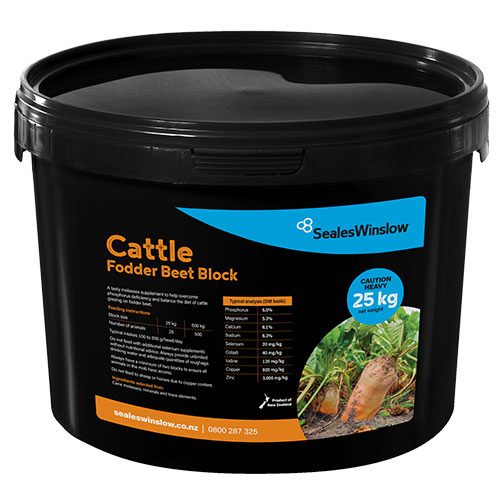Dairy Advice - Winter
Making the Most of Fodder Beet
With yields of up to 30 tonnes of dry matter per hectare, fodder beet has gained a reputation for being a cost-effective crop, one that offers benefits to the farmer and the animals alike.
However, there’s a proviso that needs to be kept in mind, namely the nutritional shortfalls of the crop. “Fodder beet has some inherent dietary constraints including low fibre content and low protein levels,” explains SealesWinslow Nutrition and Quality Manager, Wendy Morgan. “Mind you, these are relatively easily addressed with some supplementary silage and straw.”
There’s also the issue of cows ingesting soil while grazing on fodder beet. The problem arises because of the high iron content in our soils which interferes with the absorption of copper and other essential trace elements.
But it’s the bulb’s very low phosphorus content that is the greatest cause for concern when you consider the mineral’s implications for skeletal health, rumen function and milk production.
Farmers traditionally address this deficiency by dusting with dicalcium phosphate; but it’s an unpleasant, regular and time-consuming task that offers moderate success at best and is also quite wasteful, as much of the phosphate ends up on the ground.
So what’s the alternative? Wendy says that the easiest and most effective solution by far is to use SealesWinslow Fodder Beet Block. The molasses based block is formulated with phosphorus, magnesium, calcium, sodium, cobalt, copper, iodine, selenium and zinc; it provides the precise mineral needs for dairy cows and beef cattle that feed on fodder beet. The convenience of simply placing one tub per 25 animals along the fence line is as compelling as its cost-effectiveness. That’s why the Fodder Beet Block is fast becoming the supplement of choice on farms where cows overwinter on fodder beet.
DON'T FORGET ABOUT PHOSPHORUS
- Major component of the skeleton
- Vital for rumen function
- Needed for bone strength, energy metabolism and milk production
- Symptoms of low-grade phosphorus deficiency include reduced appetite and rapid weight loss
- Deficiencies are not immediately obvious as cows mobilise their existing phosphorus reserves first; effects typically show up at calving time or during early lactation.

Cattle Fodder Beet Block
Cattle Fodder Beet Block is a dietary support for stock grazing fodder beet, helping prevent the development of phosphorus deficiencies in cattle.

